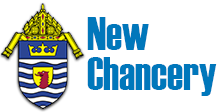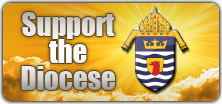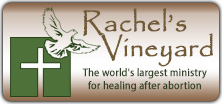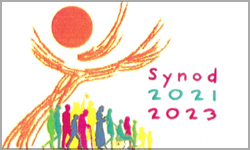“Whoever eats my flesh and drinks my blood remains in me and I in him.” John 6:56
My Dear People of God,
“At the Last Supper, on the night he was betrayed, our Savior instituted the Eucharistic sacrifice of his Body and Blood. This he did in order to perpetuate the sacrifice of the Cross throughout the ages until he should come again, and so to entrust to his beloved Spouse, the Church, a memorial of his death and resurrection: a sacrament of love, a sign of unity, a bond of charity, a Paschal banquet ‘in which Christ is consumed, the mind is filled with grace, and a pledge of future glory is given to us’” (Sacrosanctum concilium, 47, cf. Catechism of the Catholic Church, #1323).
 This is the teaching of the Second Vatican Council. It is nothing new. It expresses the doctrine of the Church as found in the Sacred Scriptures, abundantly resourced in the Gospels and in the writings of St. Paul particularly (Mathew 26:17-29; Mark 14:12-25; Luke 22:7-20; I Corinthians 11:23-26). It is found in the earliest writings of the Fathers of the Church stretching back to the first centuries of Christianity (e.g. St. Justin, Apologia 1, 65-67, circa 155 A.D.). It is what we believe as Catholics. It is what we hold dear to us, what we express, celebrate and commemorate when we participate in each and every celebration of the Holy Mass.
This is the teaching of the Second Vatican Council. It is nothing new. It expresses the doctrine of the Church as found in the Sacred Scriptures, abundantly resourced in the Gospels and in the writings of St. Paul particularly (Mathew 26:17-29; Mark 14:12-25; Luke 22:7-20; I Corinthians 11:23-26). It is found in the earliest writings of the Fathers of the Church stretching back to the first centuries of Christianity (e.g. St. Justin, Apologia 1, 65-67, circa 155 A.D.). It is what we believe as Catholics. It is what we hold dear to us, what we express, celebrate and commemorate when we participate in each and every celebration of the Holy Mass.
When I visit our Catholic schools and catechism classrooms, I ask our second graders what important sacrament they will receive for the first time during the year. They answer, “The Holy Eucharist” or “First Holy Communion.” They express to me how excited they are to receive this great sacrament. They know the sacrament’s importance in their lives. They are genuinely prepared, in their own innocent and childlike way, to receive Jesus Christ, Body, Blood, Soul and Divinity.
However, how sad it is to hear an innocent child say to me that he or she wants to go to Mass but “my parents will not bring me.”
Often, I think, we do not realize how great a gift we have in the Eucharist. We treat this gift as we would some duty or obligation. We take vacations from duties and obligations. We frequently neglect duties and obligations.
This sad circumstance prompts me to reflect on the words of St. John the Baptist. Although our Lord said of St. John the Baptist that no one born of woman was greater than he was (Mathew 11:11), when pressed by the Pharisees to identify himself, St. John the Baptist said that our Lord was “the one who is coming after me, whose sandal strap I am not worthy to untie” (John 1:27). If one as great and privileged as St. John the Baptist saw himself humbled before our Lord, how much more should we.
As our Lord said to the Samaritan woman at the well, “If you knew the gift of God and who is saying to you, ‘Give me a drink,’ you would have asked him and he would have given you living water” (John 4:10). Yet our Lord gives to us His Body, Blood, Soul and Divinity, born itself from His sacrifice upon the Cross, and we ignore it. We neglect this needed gift which we have done nothing to deserve.
How true it is that gifts of love are the ones humans most often neglect. Whether in parental love or spousal love or that of close friendship, these sacrificial gifts of oneself to another sometimes go unappreciated and unrecognized for what they really are. Every gift of love is born of sacrifice. Perhaps this is why we find it difficult at times to acknowledge the gift. We simply forget the sacrifice. The same is true of the Eucharist.
In an age where sacrifice is shunned, avoided, and not easily understood as a necessary attribute for love, it is worth remembering that the Eucharist is inseparable from the sacrifice of the Cross of Jesus Christ. For this reason in the same letter in which he recalls the institution of the Eucharist, St. Paul writes, “[W]e proclaim Christ crucified” (I Corinthians 1:23). Later the Apostle to the Gentiles will conclude, “For as often as you eat this bread and drink this cup, you proclaim the death of the Lord until he comes” (I Corinthians 11:26).
Sacrifice lies behind the gift of the Eucharist. The Eucharist apart from sacrifice is inconceivable. Without sacrifice, there is no Eucharist, only a fellowship or convivial meal. As praiseworthy as those might be, sacrifice gives definition to the Eucharist because the sacrifice of the Cross brings about redemption. The Letter to the Hebrews speaks eloquently of this redemptive sacrifice of Jesus Christ: “But when Christ came as high priest of the good things that have come to be, passing through the greater and more perfect tabernacle not made by hands, that is, not belonging to this creation, he entered once for all into the sanctuary, not with the blood of goats and calves but with his own blood, thus obtaining eternal redemption” (Hebrews 9:11-12). By Christ’s sacrifice we are redeemed, and the Eucharistic sacrifice of the Mass makes that one and only sacrifice present to us here and now. As expressed by the Second Vatican Council, the sacrifice of the Cross is perpetuated throughout the centuries (Sacrosanctum concilium, 47).
Nothing, apart from illness or physical impossibility, should prevent us from attending Mass. The gift is too great, our participation too necessary, our redemption too important.
I leave you with these modest reflections which I pray will move your hearts and minds to a deeper appreciation of the mystery we celebrate at each and every Holy Mass. May the Lord, who offered Himself upon the altar of the Cross for our salvation, bring you ever more closely to His gift of love made visible in the Holy Eucharist. May we receive Him worthily. May we not neglect to share this profound love with our children and pass on to them the living conviction that where Christ is consumed, the mind is filled with grace, and a pledge of future glory is given.
Praying God’s blessings on each and every one of you, I remain
Devotedly yours in our Lord, 
![]() Glen John Provost
Glen John Provost
Bishop of Lake Charles
















